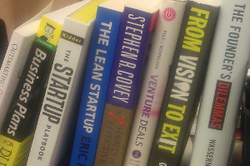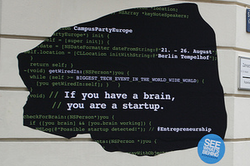Finding the Right Startup Incubator for Your Ed-Tech Startup
Startup incubators (and accelerators), which help startups with mentorship, connections, office space, and sometimes capital, are ubiquitous these days. EdSurge currently lists 30+ incubators that either specialize in, or have worked with, education-related startups.
I can’t speak about what it’s like at a big-name incubator like Imagine K12 in Silicon Valley or Kaplan EdTech Accelerator in NYC; you can read about that in this Education Week article. But I can share our experience at three smaller incubators in Philadelphia:
- The Wharton Venture Initiation Program (while I was a student at UPenn)
- GoodCompany Ventures (Summer 2013)
- Project Liberty Digital Incubator (right now)
Each experience has helped us to grow and improve, beyond what we could have achieved on our own in the same amount of time.
But there are some important issues to consider when determining whether an incubator is the right fit for you and your startup. For example:
1. Is the programming right for you?
 Incubators are not interchangeable. For example, the programming at some incubators may be better suited to helping early-stage startups who are still in the “business planning” phase, while others may be better suited to help startups who are further along in the “product development/beta-testing” phase.
Incubators are not interchangeable. For example, the programming at some incubators may be better suited to helping early-stage startups who are still in the “business planning” phase, while others may be better suited to help startups who are further along in the “product development/beta-testing” phase.
It’s important to look at where you are in your journey and make sure that the incubator actually helps you with what you currently need.
2. Is the timing right for you?
 Being part of an incubator can be really beneficial, but it can also be very time consuming. And time (or rather, the lack of time) is the biggest challenge most entrepreneurs face. You only have so much runway to get your startup up and going, so you have to ask yourself, at the end of six months or a year (or however long you have), where do I need to be with my startup? And will being part of this incubator help me get there?
Being part of an incubator can be really beneficial, but it can also be very time consuming. And time (or rather, the lack of time) is the biggest challenge most entrepreneurs face. You only have so much runway to get your startup up and going, so you have to ask yourself, at the end of six months or a year (or however long you have), where do I need to be with my startup? And will being part of this incubator help me get there?
The answer isn’t necessarily yes. For example, if you only have a few months of runway left and you already have a pretty solid business strategy developed, you may choose to skip the incubator and focus on getting a beta product out on your own to test your concept.
3. Is the location right for you?
 Many of us simply aren’t in a position (because of family, work, school, etc.) to move to another city for a few months to participate in an incubator. While incubators differ in their residency requirements, I do think it’s important to think beyond the duration of the incubator, because a big part of the experience is meeting and making connections with other entrepreneurs, advisors, mentors, etc.
Many of us simply aren’t in a position (because of family, work, school, etc.) to move to another city for a few months to participate in an incubator. While incubators differ in their residency requirements, I do think it’s important to think beyond the duration of the incubator, because a big part of the experience is meeting and making connections with other entrepreneurs, advisors, mentors, etc.
But many of those connections you make may be local/regional to the incubator. If you move home after the incubator ends, will those connections still be accessible and/or useful to you? Keep that in mind as you decide whether to relocate for an incubator.
4. What are you “paying” in order to participate?
 Incubators differ in terms of what your “obligations” are as a start-up. Some will offer their programming for free, some will require the right to participate in future financing rounds, and some will require an equity stake in exchange for some cash and their services. There’s a big range across incubators in terms of what they’ll ask from you, so do your homework to make sure that you’re “paying” the right price for what you’re getting.
Incubators differ in terms of what your “obligations” are as a start-up. Some will offer their programming for free, some will require the right to participate in future financing rounds, and some will require an equity stake in exchange for some cash and their services. There’s a big range across incubators in terms of what they’ll ask from you, so do your homework to make sure that you’re “paying” the right price for what you’re getting.
5. Do you like the people running the program?
 I actually think this is the most important consideration. Ultimately, the incubator experience boils down to the people: both the people running the program and the other startups in the program. You probably won’t have much visibility on the other startups who will be participating with you before the start of your class (but don’t be afraid to ask). However, you will get the chance to meet the people in charge of running the incubator during your interview or pitch.
I actually think this is the most important consideration. Ultimately, the incubator experience boils down to the people: both the people running the program and the other startups in the program. You probably won’t have much visibility on the other startups who will be participating with you before the start of your class (but don’t be afraid to ask). However, you will get the chance to meet the people in charge of running the incubator during your interview or pitch.
You want to make sure that you like them, respect their opinions, and trust their judgment, because you will be spending a lot of time working together and you want to make sure that time is well-spent. If you can, you should also talk to startups in previous classes to learn about their experience.
We’ve really enjoyed and benefited from our incubator experiences. If you have any specific questions about the incubators we were a part of, let me know @professorword.
Until next time,
Have questions or feedback? Comment below or let me know on Twitter @professorword!
See also:
- Startup Hopefuls Test Ideas on Educators
- Ed-Tech Accelerators Launch Second Round of ‘Classes’ for Startups
- Houghton Mifflin Harcourt Launches Internal Tech Incubator
Photo Credit: Flickr users Campus Party Europe, erlkaow, photosteve101, Marc Smith, Ray Dumas
